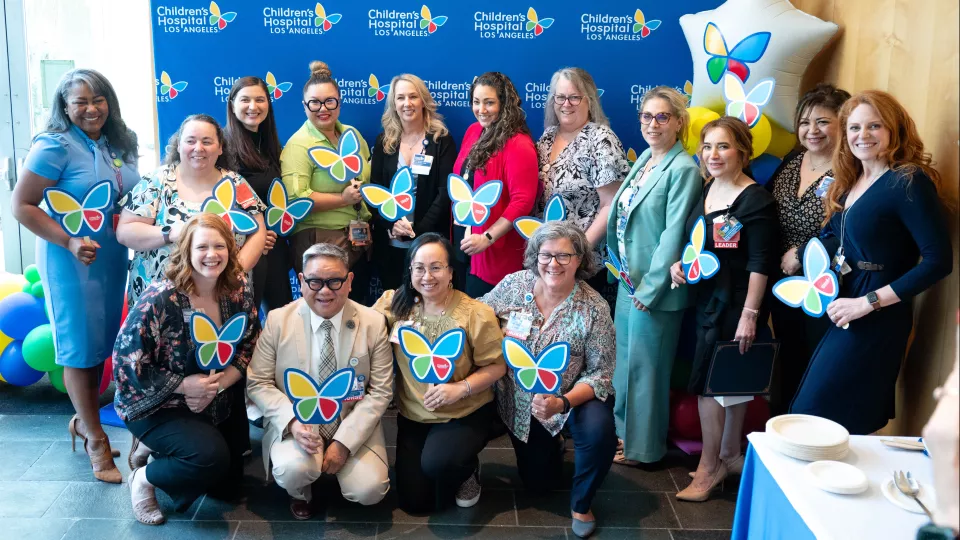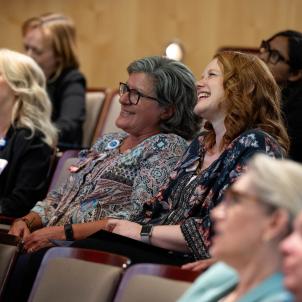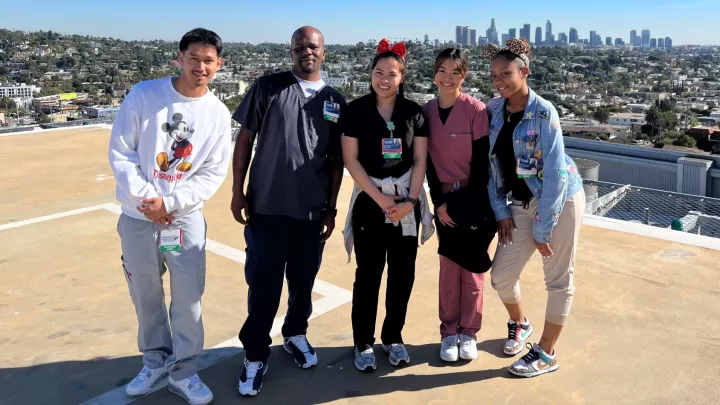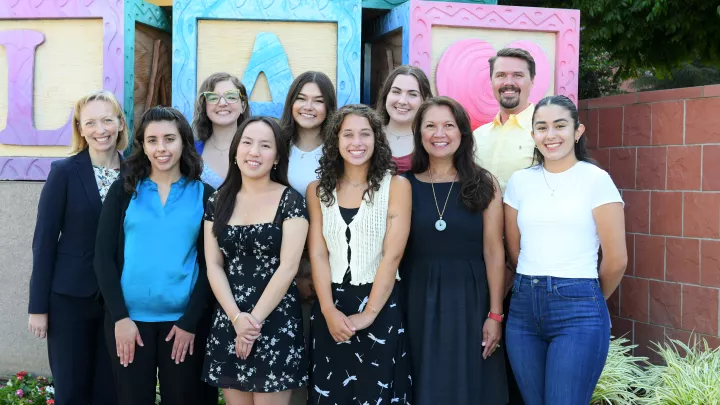
The first group of participants in the Inspire Nurse Leadership Development Program
Inaugural Cohort Graduates From New Nurse Leadership Development Program
“You are the future of nursing,” Kelly Johnson, PhD, RN, NEA-BC, declared to the 18 nurse leaders seated inside the auditorium in The Saban Research Building at Children’s Hospital Los Angeles.
In her audience was the first graduating cohort of the Inspire Nurse Leadership Development Program, an initiative launched in July 2023 to advance the leadership skills of CHLA’s nurse managers and supervisors. The project represented another example of the hospital’s emphasis on creating avenues for the professional development of its team members.
As she addressed them, Dr. Johnson, Senior Vice President of Patient Care Services and CHLA’s Chief Nursing Officer, exhibited one of the core teachings of the program: Inspire your team.
“We need your leadership at the front line,” she said. “It's never more important than now. … The more we can equip you with the skills, knowledge and abilities to lead to your maximum potential, the better off you're going to feel about the job you're doing.”
Toward becoming better leaders

The graduation ceremony capped the first year of the program, built by the Patient Care Services leadership team in collaboration with Inspire Nurse Leaders (INL), an organization that works with nurses to develop their leadership capacities.
The training includes six in-person sessions, held eight weeks apart, devoted to a half-dozen leadership competencies, and six virtual meetings that allow participants to reconvene and review what they have experienced and learned thus far. Over the course of the year, each nurse undertakes a quality improvement project that relates closely to their job. A summary of the project and its outcomes are displayed in a gallery of poster presentations at the graduation ceremony.
Dr. Johnson says the program is another demonstration of CHLA’s effort to nurture the abilities of its workforce. She explains that nurses tend to advance into management after excelling as clinicians—but a pathway to usher them toward becoming great people leaders had been missing.
“This is a foundation to help them expand their leadership capacity outside of their clinical expertise,” she says.
Participants are linked up with an executive coach from Inspire Nurse Leaders, who offer them guidance and a rolling assessment as they develop their skills over the 12 months. Dr. Johnson says that piece of the program is essential: “I still have a coach after 31 years of leading.”
Rejuvenation and restoration

A common motive among the graduates that led them to join the program was the desire to get better at some aspect of leadership where they saw they were lacking.
For Sue Martinez, DNP, RN, CPN, NE-BC, Manager of Patient Care Services, that area was having hard conversations—or “radical candor,” as it’s also called. “When we have to make some difficult choices, navigating radical candor and really talking to people in real time about hard issues, I felt like I needed help in those areas, and that was what I hoped INL would bring to me.”
Martinez says she got much of that help through peer-to-peer coaching, gaining enormous benefits from having access to other nurse leaders who have faced many of the same predicaments.
“They’ve been there and can say, ‘I’ve had that situation happen, and this is the way I handled it and it worked well for me—or I did it this way and it didn’t work well for me, and this is what I learned from that.’ Their expertise gave me the confidence to practice these skills. That really helped me.”
Beth Zemetra, MHA, RN, NE-BC, Nurse Manager in the Cardiothoracic Intensive Care Unit, says she learned that the task of leadership requires her to be more vocal, which goes against her nature.
“I'm very introverted, very quiet,” she says, “and I recognized I need to be intentional about having conversations, about folks in the room knowing what my viewpoint is. I can't just be quiet. I need to make sure those who I'm leading know where I stand.”
This growth in self-awareness accompanied the skill development, but still was only part of the reward the nurses say they received. They also relished the program’s social element—the chance to get away from the regularity of their job and have meaningful, friendly interactions with their colleagues.
“It almost felt like we were playing in a sandbox,” Martinez says. “We got to do things that were creative. We got to talk about things and unpack things that are challenging for us and do it with people in a protected time and space. It was never boring, it was never not interesting. For me, it was rejuvenating.”
Similarly, Zemetra found the experience restorative. The burdens the pandemic placed on nurses had fried her energy and had changed her job—keeping her in the office, distancing her from what was happening on her unit, and driving down her motivation. The program started her back in the other direction.
“It ignited something that woke me up a little bit, helped me to engage a bit more, find more joy in my work,” she says. “I think I'm leading better because of that.”


